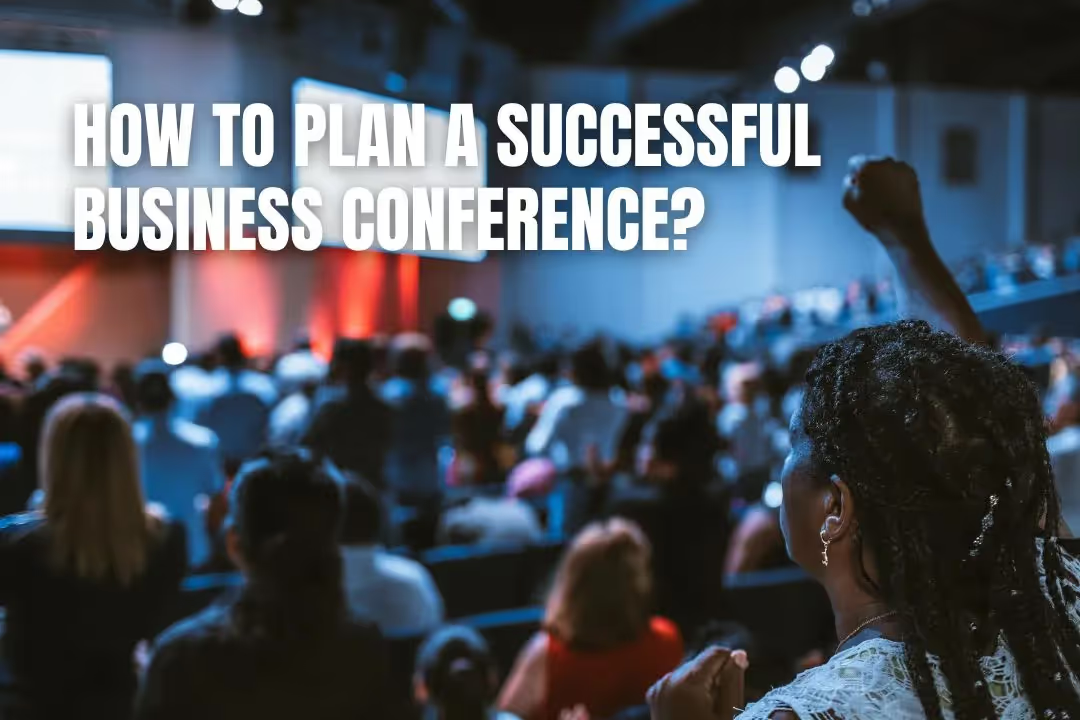
Editorial Disclaimer
This content is published for general information and editorial purposes only. It does not constitute financial, investment, or legal advice, nor should it be relied upon as such. Any mention of companies, platforms, or services does not imply endorsement or recommendation. We are not affiliated with, nor do we accept responsibility for, any third-party entities referenced. Financial markets and company circumstances can change rapidly. Readers should perform their own independent research and seek professional advice before making any financial or investment decisions.
The purpose of business conferences is to exchange ideas, build connections, and develop business growth. In order to organise a successful business conference, extensive planning and preparation must be put into place. Henceforth, many people often wonder how to plan a successful business conference.
As you begin planning your event, you can start by setting clear goals, choosing a suitable location, delineating the format, developing a pricing strategy, setting a budget, selecting speakers carefully, efficiently managing registrations and ticket sales, and finally, assessing the event's success.
The Planning process for a business conference doesn’t end here, in our article, we'll explain each of the steps in detail, offering practical insights and tips on how to ensure that your next business conference achieves its goals and leaves a lasting impression on the attendees.
Each year, professionals from around the world gather in major countries like Canada for a prestigious business conference. These conferences offer an opportunity to meet and network with industry leaders as well as innovators at this event. As a result, you will have the opportunity to network, learn, and grow.
The business conference in Canada is a must-attend for entrepreneurs and executives. Participants engage in workshops designed to improve skills and expertise. In such conferences, the keynote speakers share various insights on current market trends and future business landscapes. Attendees leave inspired and better equipped for success.
During the event, participants will have the opportunity to network with peers. The Canadian business conference encourages collaboration and innovation, driving new ideas and partnerships. Businesses are given practical advice to thrive in a competitive market. Engaging in these events broadens perspectives and inspires actionable steps.
Planning a successful business conference can seem daunting, but with the right approach, it becomes an achievable task. We’ve prepared a step-by-step guide, which will help you through the essential steps to ensure the upcoming business management conference is both productive and memorable. From choosing the perfect venue to engaging your attendees, we've got you covered.

Define the objectives you aim to achieve with the conference. Clear goals help guide every decision and measure success. Align your event’s purpose with the needs of your target audience.
Choose a venue that is accessible, equipped, and suitable for your event's scale. The location should improve the conference experience. Consider services, accommodation options, and transportation links.
Decide on the structure of your conference, including sessions, workshops, and networking opportunities. A well-defined format keeps attendees engaged and facilitates learning. Make sure your activities are customised to the participant's goals.
Develop a comprehensive budget covering all aspects of the event. Your pricing strategy should reflect the value offered. Consider different ticket tiers to attract a broader audience.
Make sure to select speakers who are both experts and able to draw the attention of the audience. There is no doubt that their knowledge and reputation are crucial to the success of the conference. Ensure their topics align with your goals.
Implement an efficient system for handling registrations and ticket sales. A seamless process increases attendee satisfaction. Utilise technology to streamline these operations.
After the conference, assess its success against your goals. Gather feedback from attendees and stakeholders. This evaluation is essential for continuous improvement and future planning.
Designing an effective conference format is essential for keeping attendees engaged and ensuring a memorable experience. A well-rounded program should include various session types and interactive elements. Here are key components to include in your conference format.
Choosing the right speakers can significantly impact the success of a business conference. Their expertise, presentation style, and relevance to your audience are crucial. Here are the key factors to consider when selecting speakers for your event.

Ensure speakers are experts with substantial knowledge in their respective fields. Their expertise adds credibility and value to your conference. Look for those with a proven track record. Their depth of knowledge should resonate with your audience.
Choose speakers who can captivate and engage your audience. Their delivery should be dynamic and interactive. Engaging presenters keeps attendees interested and makes the content memorable. This strengthens the overall conference experience.
Speakers must address topics relevant to their audience’s interests and needs. Consider your attendees' demographics and professional backgrounds. Relevant content ensures higher engagement and satisfaction. Tailor speaker selection to match your conference’s theme and goals.
Consider the availability of your chosen speakers well in advance. Coordinate their schedules with your event dates. The early confirmation prevents last-minute changes. Ensure they can commit to the entire duration of their session.
Select speakers who can provide practical, actionable insights. Their presentations should offer tangible takeaways. Valuable insights increase the learning experience for attendees. This makes your conference more impactful and worthwhile.
Creating a comprehensive budget is a cornerstone of planning a successful business conference. It ensures that all necessary expenses are covered and financial resources are managed efficiently. Here's why budgeting is essential for a business conference.
As you must have learned by now a successful business conference requires careful planning and attention to detail. It is fundamental to set clear goals, choose an appropriate location, and define the format. Pricing strategy, budgeting, selecting the right speakers, and managing registrations are all equally important.
The process of how to plan a successful business conference involves balancing various elements to create a cohesive and engaging experience. There are keynote presentations, panel discussions, workshops, networking opportunities, and interactive sessions. Speaker selection and budgeting are also crucial to event success.
These guidelines can help your business conference encourage valuable connections, inspire innovation, and drive business growth. You want your conference to achieve its goals and leave a lasting impression on attendees. With these strategies in place, your event can stand out as a premier gathering for industry professionals.
The purpose of business conferences is to exchange ideas, build connections, and develop business growth. In order to organise a successful business conference, extensive planning and preparation must be put into place. Henceforth, many people often wonder how to plan a successful business conference.
As you begin planning your event, you can start by setting clear goals, choosing a suitable location, delineating the format, developing a pricing strategy, setting a budget, selecting speakers carefully, efficiently managing registrations and ticket sales, and finally, assessing the event's success.
The Planning process for a business conference doesn’t end here, in our article, we'll explain each of the steps in detail, offering practical insights and tips on how to ensure that your next business conference achieves its goals and leaves a lasting impression on the attendees.